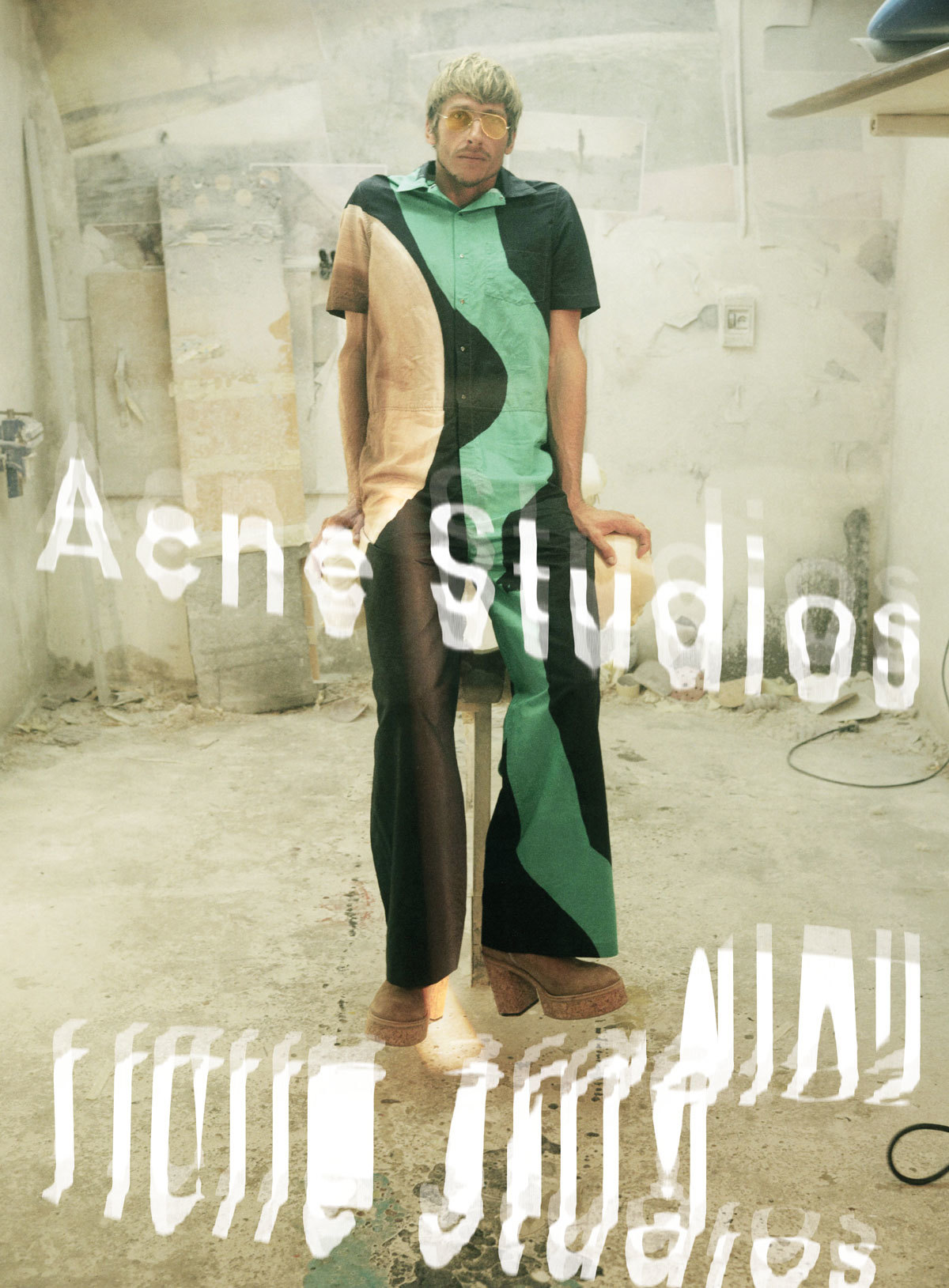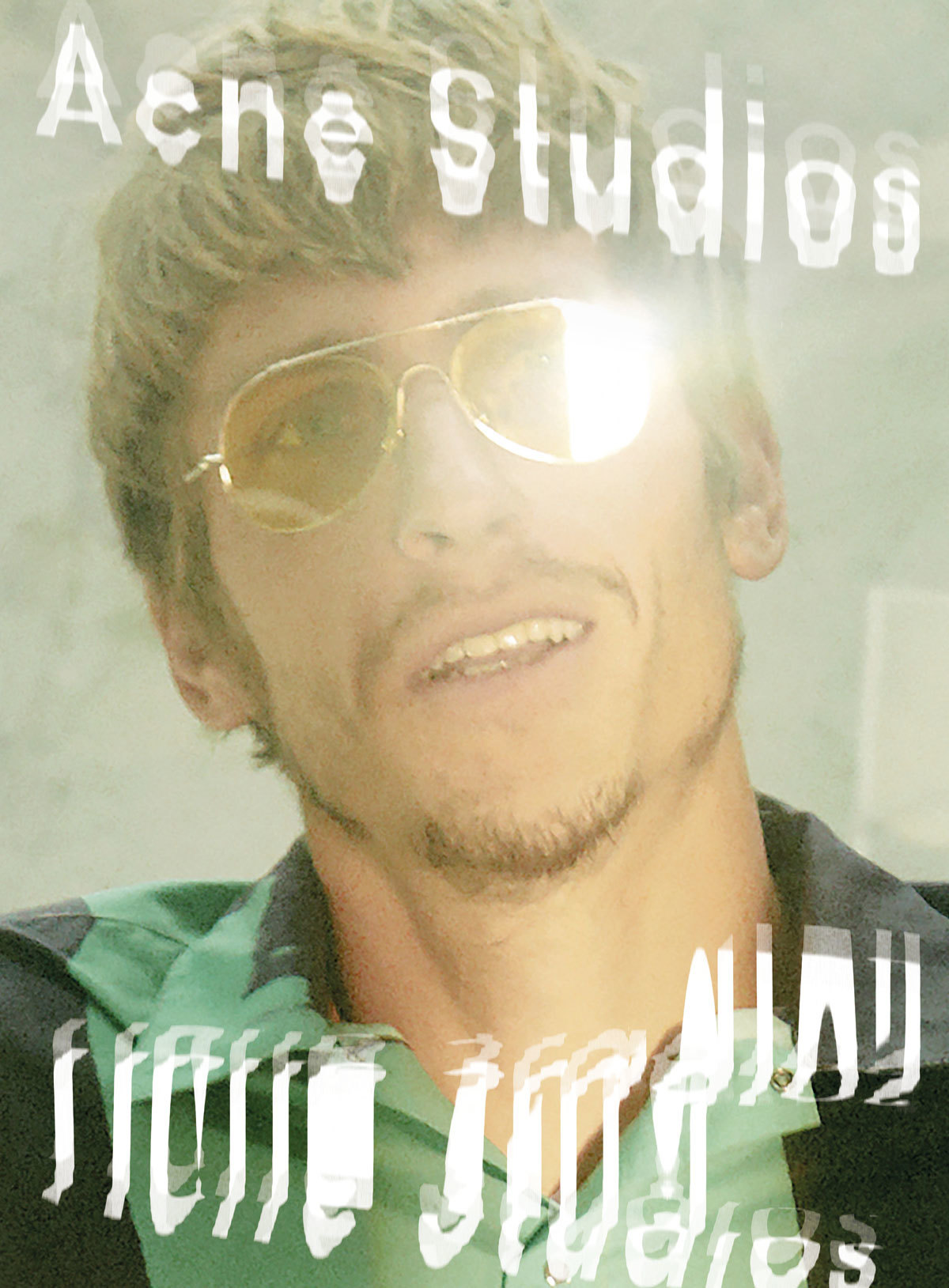Why has it taken so long to do a men’s focused campaign, and why did the time feel right?
JJ: For me, it is about finding the best idea to present Acne Studios. This season I really wanted to take the spring/summer 16 men’s collection to its core. I’m obsessed with surfing and one of the inspirations is the surfer Robin Kegel, who also created prints for the collection. It therefore felt natural to shoot Robin in his Biarritz studio where he creates his surfboards. David Sims, also a surfer, shot the campaign and I’m really pleased with the images.
Where did you meet Robin and what did you love about him?
JJ: When discovering surfing I realized that I was more interested in the European surf culture than the more obvious Californian [culture]. I kept on seeing and hearing about this guy, Robin, who made surfboards. Once I was in Biarritz surfing and I realized that he was at the same place; one thing lead to another. I think he is a very inspiring person and I see so many similarities in how he works now to how Acne Studios started back in 1996. It’s a fearless, more instinctive way of working.
How did he influenced the collection and campaign?
JJ: Robin does the most amazing designs for surfboards, and every night I would look at Japanese webstores to see if they’d got a new design by him. I didn’t want to do an obvious surf collection, rather to use his graphics on clothing itself. We’ve made these jumpsuits that are almost as tall as a surfboard to show all his graphic waves and circles, and then also used the print on cashmere sweaters that have been purposefully pilled, as if worn everyday by someone who’s just come out from the surf. Robin’s attitude to dressing is in the whole collection. When we presented the collection, we made wigs for the models like his own self-cut hair.
Your last womenswear campaign using your son Frasse was a sensation. What were some of the reactions to that?
JJ: I think the majority of the reactions were positive since it is more a matter of finding a modern expression than caring about pre set boundaries or norms. I’m most proud of Frasse who dealt with the attention, campaign and collection in a really careless and natural way.
Next year is Acne’s 20th birthday. How do you plan to celebrate?
JJ: I’m not really the person to stop and celebrate those things. I’d rather focus on moving forward. However, I’m obviously really proud of what we have accomplished over these 20 years.

How did Jonny come across you, Robin? What was it like working with him and meeting him?
RK: From my understanding, Jonny recently became infatuated with surfing culture. I was away from my factory in France when he visited my employees, who spoke of a very intrigued character who had stopped by from Sweden. He later told me that he was captivated by the splashes of color spilled all over the place, and the guys busting ass to the beat of abrasive jazz. He placed an order for special boards upon my return. Meanwhile, I got a message from my distributor in Japan saying a Swedish brand bought the limited edition solid Balsa wood board I just sent there.
Months later I got a call from someone at Acne Studios proposing a trip to Stockholm to discuss a possible collaboration. Jonny meet me the day after I arrived; he seemed very particular and friendly, as if we’d known each other a while. He proceeded to explain what he liked about my brand and work. I was shocked to be in Stockholm, far from any surf spot, with a established fashion mogul, explaining to me the impressive elements he discovered in my work from past projects. Many of the things he was reminding me of were overlooked by the surf industry, or short lived, most likely too conceptual to appeal to the alternative action field. Anyways, Jonny saw potential in the aesthetics and designs.
How does it feel to be one of the inspirations behind the new collection?
RK: The Acne team created a sphere that relates to my personal realm, so I’m flattered that elements from the hack hair cut, to the messy factory fits their collection. Everything was natural, nothing was contrived and the collaboration fused my abstract designs with the rest of their collection.
What do you make of the surfing world right now ?
RK: The surfing industry, the act of going surfing, and surfing around the world, are all completely different statements. The industry in the past few decades has moulded a free lifestyle into something commercial. I find satisfaction in manufacturing custom limited edition classic surfboards, traveling the world crafting and working with friends in each location to run the business. I mean most of us don’t have a desk or a chair anywhere in the work place. Surfing is so over exposed these days, because the act of surfing is so fun and attractive to anyone who enjoys the water and nature.
What inspires the look of your boards?
RK: Jonny and the crew were inspired by the geometric patterns, colors and abstract forms that have become iconic with my work. They saw the artistic styles as inspirational, as well as fitting the less stereotypical values of the surfboards. My designs have a sensual aesthetic that was initially inspired by bossa nova and bohemian avant-garde. I want my work to be a fusion of both functional surfing performance elements and art.
Why did you move to Biarritz?
RK: I came to France to reincarnate surf and bring classic California style to Europe. It leads to a cross cultural exchange with the old world and uncharted coasts. The surfing culture in Europe is fairly new whereas the surf culture of California is well distinguished. Many Europeans look at the Californian surf culture, but they should really look to Hawaii, the original gods of surf.
Credits
Text Stuart Brumfitt
